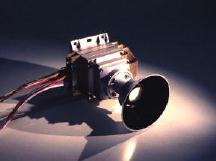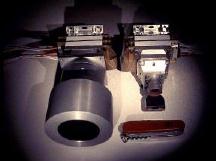MALIN SPACE SCIENCE SYSTEMS, INC.
SAN DIEGO, CA 92191-0148
TELEPHONE: (619) 552-2650, EXT. 500
http://www.msss.com/
Contact: Michael Ravine
FOR IMMEDIATE RELEASE FEBRUARY 23, 1998
THREE CAMERAS DELIVERED FOR MARS SURVEYOR '98 SPACECRAFT

Mars Descent Imager
|

Mars Color Imager
|
Malin Space Science Systems (MSSS) has delivered three cameras for
NASA's next mission to Mars, Mars Surveyor 1998. The Mars Descent
Imager (MARDI--image #1) has been installed on the Mars Polar Lander
at the Lockheed Martin Astronautics plant in Littleton, CO. MARDI will
acquire a series of panchromatic images of the landing site during
descent, beginning shortly after the lander's parachute is deployed.
The Mars Color Imager (MARCI) medium angle unit (image #2, left) and
wide angle unit (image #2, right) are presently on the Mars Climate
Orbiter, awaiting environmental testing at the Lockheed Martin
facility. The two MARCI units will provide global coverage of Mars at
moderate and low resolution at ultraviolet, visible, and near infrared
wavelengths.
"From the orbiter, the MARCI wide angle system will image all of Mars
at a resolution of 7.5 km (4.6 miles) each day," said Dr. Michael
Malin, Principal Investigator of the MARCI. "This daily global weather
map will show us how Martian atmospheric circulation varies over the
mission, much as weather satellites do for Earth. The MARCI medium
angle camera will take 40 m (130 ft) resolution images in eight
colors, allowing us to characterize surface properties and changes in
dust cover over large parts of the planet. During the lander descent,
MARDI will take pictures from an altitude of 8 km (5 miles) all the
way down to the surface. This will be the first time since Apollo that
images were acquired during descent to the surface of another planet.
In addition to showing exactly where the spacecraft landed, this
series of pictures will provide a link between the images taken from
orbit and those taken after landing." Dr. Malin is also Principal
Investigator on MARDI.
MARDI and MARCI incorporate an innovative electronics design that
enables high-quality scientific data acquisition in a very compact
package--each unit weighs about one-half kilogram (one pound), which
is less than one-tenth the weight of any previous orbiter or lander
camera sent to Mars. The design is also extremely conservative of
power, using only three watts during data acquisition.
The MARDI and MARCI instruments were developed by MSSS under a $3.5
million contract from the Jet Propulsion Laboratory, Pasadena, CA.
MSSS will also provide two instruments based on the MARDI/MARCI
architecture for the Mars Surveyor 2001 mission: a descent imager for
the '01 lander and a visible imaging subsystem as part of Arizona
State University's Thermal Emission Imaging System (THEMIS) for the
'01 orbiter.
|

